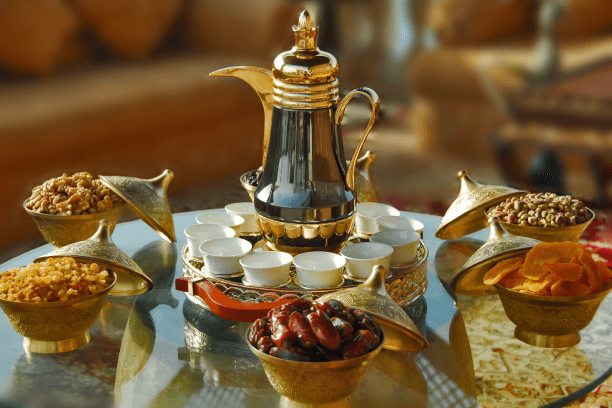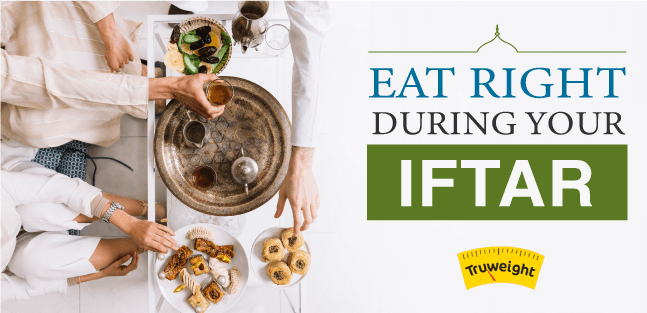Food & Nutrition, Healthy Cooking, Weight Loss
All You Need To Know To Stay Fit And Eat Healthy During Ramadan
Ramadan may give you a chance to indulge in your favorite food, since not eating all day should be rewarded with exceptional evening meals, right?
But do you know that Ramadan can be a perfect opportunity for the healthy beginning your body needs. Fasting, as we all know, has been recognized for numerous health benefits.
Table of Content
- Weight gain during Ramadan
- Do’s to Staying fit during Ramadan
- Don’ts to Staying fit during Ramadan
- Eat healthy during Ramadan
- What to eat?
- How your pre-dawn meal (Sehri) should look like?
- How your post-dusk meal (Iftaar) should look like?
- Foods to avoid during Ramadan
- Healthy food alternatives
Fasting is a natural detox that helps boost metabolism and promote weight loss, it improves cardiovascular health, lowers blood pressure and helps in cell recycling among many others.
So do not waste your time and start your physical fitness as the holy month of Ramadan has started.

6 Reasons for weight gain during Ramadan
Maintaining your weight and even losing some is totally achievable during Ramadan but some people end up gaining more weight.
Do you know why? Due to uncontrolled food intake in the evenings that leads to undesirable weight gain.
- Eating continuously, especially between ‘Iftaar and Sehri’.
- Eating fried and high calories food in large uncontrolled amounts, especially in the evenings.
- Consuming large portions of food, more than the usual.
- Inactivity and lethargy after Iftaar.
- Consuming large portions of high calories drink.
- Consuming a large portion of desserts and sweets during ‘Iftaar’ and ‘sehri’.
5 do’s for staying fit during Ramadan
- Drink at least 2 glasses of water during ‘suhoor’ or ‘sehri’.
- Eat fruits so that you remain hydrated all day. Fruit chat is a best option for both ‘suhoor’ or sehri.
- Avoid hunger pangs by including fiber, proteins and carbs in your meals.
- Break your fast with a date it is high in fiber and potassium and helps in water retention.
- Exercising is an important factor to help you burn fat. Walk every day for at least half an hour after ‘Iftaar’.
6 don’ts to keep in mind to stay fit during Ramadan
- Avoid breaking your fast with spicy foods and fried items. It will cause indigestion and heartburn.
- Avoid breaking your fast with ‘sherbet’, packed juices and cold drinks, instead have water.
- Don’t overeat out of insecurity avoid binge eating to bring down blood sugar levels.
- Do not rely on junk food. Eat nutritious food.
- Avoid desserts and processed foods if you are trying to lose weight during Ramadan.
- Do not start a new workout regime while you are fasting.
6 ways to eat healthy during Ramadan
Here are some tips that will definitely help you in managing your weight during the fasting month.
- Avoid overeating; have a light Iftaar that includes reasonable food portions.
- Chew your food slowly to avoid indigestion.
- Have your soup and salad first; as these are low in calories and make you feel full.
- Drink at least eight glasses of water during the non-fasting hours.
- Limit the intake of sweetened fruit juices, make your own at home instead of the readymade ones as they contain high amounts of sugar.
- Choose low fat dairy products and lean meats.
What to eat during Ramadan
The diet should be a simple meal not a feast and should not differ substantially from your normal everyday diet .
To maintain a balanced and nutritious diet, a person should consume food from all the major food groups, equally distributed between the two meal times.
You can effectively eat almost anything – from fresh fruits and vegetables to breads, cereals and potatoes, all kinds of meats and fish, dairy products, and certain amount of fats and sugar.

Here is how your pre-dawn meal (Sehri) should look like
Suhoor (the pre-dawn meal) should encompass a wholesome meal that provides long-lasting energy throughout the day like complex carbohydrates and high-fibre foods.
Complex carbohydrates are foods that are rich in energy but release this energy slowly throughout the day. Examples include whole wheat, oats, beans, and rice. Foods that are rich in fibre and are also digested slowly include fruits and vegetables.
Also don’t forget to consume fluids as they maintain water and salt levels in the body. Water and fluids with vitamins like fresh fruit juices should replace caffeinated drinks. Caffeine and cold drinks, tea, and coffee are diuretic sand promotes faster water loss through urination, which can lead to dehydration.
Here is how your post-dusk meal (Iftaar) should look like
It is customary for Muslims to break their fast with dates and water. This helps restore sugar and salt levels in the body. It also re-hydrates the body.
Balanced food and fluid intake is important between the fasting periods. In order to prevent muscle breakdown, meals must contain adequate levels of energy-rich foods, including carbohydrates and a portion of fat.
Hence a balanced diet with ample quantities of nutrients, salts and water is vital. The focus should be on mindful eating and improving overall health and setting up a behavior which can be continued even after the fast ends.
Foods to avoid during Ramadan
- Deep fried foods: Fried samosas, fried chicken, fried spring rolls and fried potato chips.
- High Sugar and High Fat Foods: Indian sweetmeats like gulab jamun, jalebi, badam halwa and barfi.
- High Fat Cooked Foods: Oily curries and greasy pastries
Healthy food alternatives
- Baked samosas, baked spring rolls, oven baked potato chips.
- Grilled or baked meat, chicken, fish as a healthier alternative while retaining the flavour and taste of the food.
For more information on healthy eating, fitness and weight loss through real and super foods, talk to our Expert Nutritionist at Possible.
The first consultation is on us. The Possible Team wishes you and your family a very happy Ramadan!
